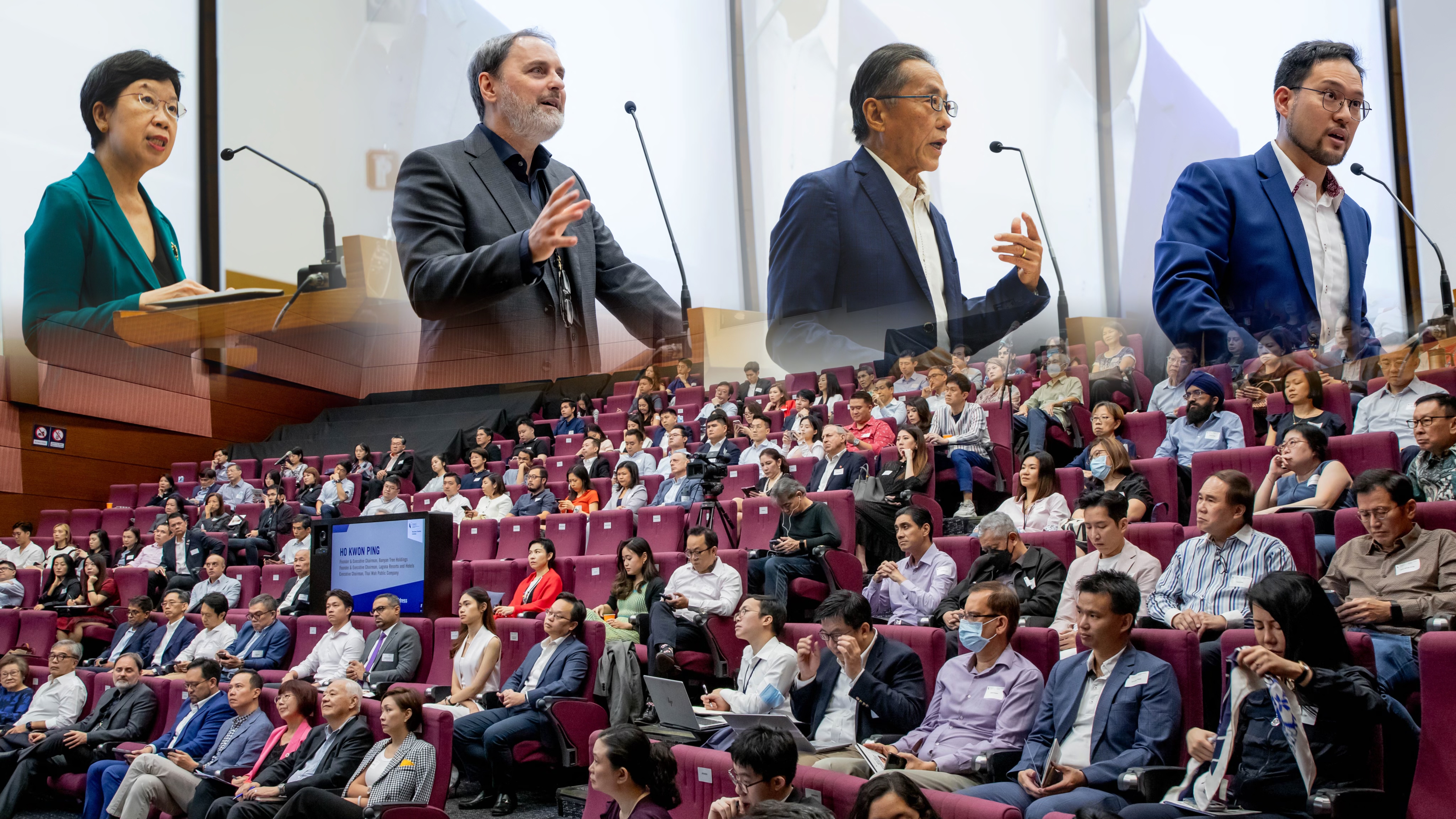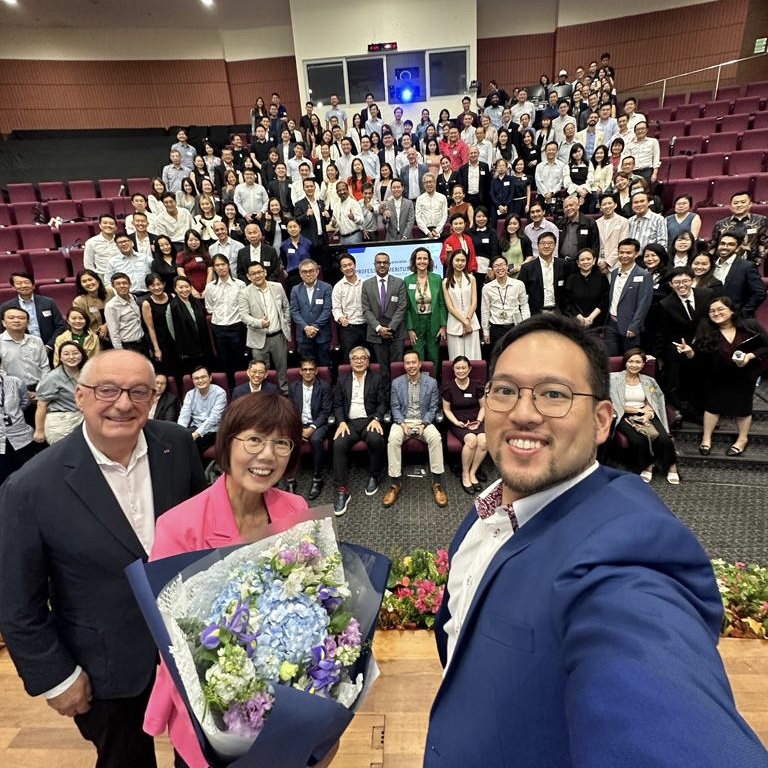
History
In 2013, Singapore Management University (SMU) set out on a mission to establish a platform to provide education, engagement, and research to help business families deal with business family-specific challenges, and to help them grow into sustainable, enduring businesses. The goal was to support business families in their business issues within the context of their unique family dynamics. The Business Families Institute (BFI) was thus launched, as Southeast Asia’s first business families-centric institute.
Achievements
A decade later, BFI has not only remained dedicated to its mission and philosophy of working with business families and for business families, but has cultivated an extensive network of business families, family offices, academic and industry partners, as well as government and trade agencies in over 30 countries globally.
Looking Ahead - Prioritising Asia and Next-Gen
In line with the University’s strategic priority area of ‘Growth in Asia’, BFI plans to expand its Family Entrepreneurship Programme to Jakarta, Bangkok and Ho Chi Minh City from 2024. This will enable family businesses in these countries to also acquire the knowledge and skills to grow, and facilitate more and deeper exchanges among families in the region, potentially leading to more collaborative opportunities and greater impact.
New initiatives involving SMU’s undergraduate community and faculty include the establishment of a student club comprising Next-Gen undergraduates across local universities, to equip them with skillsets necessary to succeed in their family businesses.
BFI 10th Anniversary Conference
BFI marked its 10th anniversary with a conference themed “From Succession Planning to Legacy Building” on 10 November 2023. The power-packed event was held at the Mochtar Riady Auditorium at SMU, attended by an audience of over 200 BFI associates, industry partners and academics.
The Conference was made possible by BFI in collaboration with Presenting Partner, OUE Foundation, Contributing Partners Cambridge Associates, The Chen Yet Sen Family Foundation, Top International Holding, and with the generous support from Consort Bunkers, House of Teak, Nomanbhoy & Sons and Woh Hup.
SMU President, Professor Lily Kong delivered the Welcome Address, which was followed by the Opening Speech by Professor Bert De Reyck, Dean, SMU Lee Kong Chian School of Business.
Mr Ho Kwon Ping, Founder & Executive Chairman, Banyan Tree Holdings, Founder & Executive Chairman, Laguna Resorts and Hotels, Executive Chairman, Thai Wah Public Company, was Keynote Speaker. In his speech, Mr Ho surmised that every business family is impacted by three types of members: the top management tier from the family, the next-gen business family members, and the inactive beneficiaries of the family. As such, these businesses need to be keenly aware of interpersonal relationships in the family. Pertinent issues that need to be addressed include tensions arising from sibling rivalry, and succession dilemmas if the next generation is not the best people to take over the business. Some transitions have been successful, but some dysfunctional.
He said, “The challenge of every next-gen of the family is to invigorate it, change, innovate, transform it so the legacy you leave is not just the pure legacy. It is the transformation of a legacy to meet the needs of the new environment.”
In face of unprecedented challenges today, he believes that BFI is well-placed to play a part in the stewardship and ownership of Asian business families.
The Conference featured an exciting line up of four panel discussions that revolve around relevant issues confronting today’s business families. Distinguished speakers from esteemed backgrounds provided a myriad of invaluable insights; we highlight them in a nutshell here.
Panel Discussion I: Charting the Path Forward for Entrepreneurial Business Families

Moderator and Panellists of Panel Discussion I
The first panel was moderated by Professor Emeritus Annie Koh, Senior Advisor, BFI & Professor Emeritus of Finance, SMU. Panellists included Professor Roger King, Senior Advisor, Roger King Centre for Asian Family Business and Family Office, HKUST; Mr Mark Lee, CEO, Sing Lun Holdings; Ms May (Kamolphan) Lerdprapapong, Venture Partner & Global Business Development, Thai President Foods; and Mr Melvyn Pun, Executive Director & CEO, Yoma Strategic Holdings.
The business leaders recounted their transformation journeys in managing their family’s business and roadblocks faced in trying to innovate while trying to preserve the family legacy. It was agreed that there is no fixed formula for the charting of successful paths, but notably, most of them went through a common experience: they were afforded the chance to thrive through exploring their ideas within their individual spheres of interest and strengths. These opportunities allowed them to innovate and grow their businesses while leveraging on their skillsets.
On a macro level, global challenges such as raging wars, stagflation, displacement of workers through technology and widening income gaps, can be seen as opportunities that can be explored for growth with an entrepreneurial spirit, said Mr Lee.
Concluding the session, Prof. King suggests that family offices should not be used only for asset management, but as a replacement to the family business. He shared the 3P concept – firstly; the Preservation of Family Wealth, secondly; Preservation of Harmony, and thirdly; Preservation of Family Value and Family Legacy. These would be the key factors to keep the family working together.
Panel Discussion II: Building the Fit-for-Purpose Family Office

Moderator and Panellists of Panel Discussion II
Moderated by Associate Professor Mandy Tham, Academic Director, MSc in Wealth Management & Associate Professor of Finance, SMU, the panel comprised Mr David Goh, Chief Investment Officer & Chief Strategist, Tecity Group; Dr Lee Oi Kum, Trustee, Houde Trust & Board Director, JKC Family Office, and Mr Prabhat Ojha, Managing Director & Head of Asia Client Business, Cambridge Associates.
For a family office to be effective, there must be a balance short-term gains and long-term growth. One often neglected aspect is creating a shared vision and plan that everyone in the family resonates with. In this discussion, panellists exchanged view points on how a collective vision can impact the effective functioning of a family office.
The panellists emphasised the importance of good values and proper structures as the key to business sustainability. In terms of values, a foundation based on respect for each other, having strong family bonds, instilling right mindsets, and prioritising the welfare of family members would breed harmony, a paramount factor to preserving lasting legacies.
Other far-reaching actions that create positive outcomes within the family office involve the transfer of relevant skills to successors from young, establishing clear objectives, implementing proper structures and parameters. That said, Dr Lee reminded that “Management must be professional. Family members must be able to step into those shoes.” Unless this condition can be met, keeping family shareholdings separate from Management through corporatisation may bring greater benefits.
Next Gen Showcase: From Buds to Bloom – Next-Gen Entrepreneurs in Family Businesses

Moderator and Panellists of Next Gen Showcase
This conversation was moderated by Professor Emeritus Arnoud De Meyer, Professor Emeritus of Operations Management, SMU. Participating in this exchange were Mr John Cheng, Founder & Managing Director, Innovate 360; Mr Vishal Vijay, Director, Strategic Investments, Agrocorp International and Ms Cynthia Wijaya, Chief Corporate Officer, Daya Selaras Group (DSG).
In the transition from one generation to another, conflicts between traditional practices and new ideas abound. How can next gen leaders preserve the heritage passed down by earlier generations while injecting innovation to transform the business?
Undoubtedly, all the panellists faced trials and tribulations in the course of starting out in their family businesses. However, there were silver linings embedded in the roadblocks. In the midst of confronting Covid challenges, Ms Wijaya found an interest in the circular economy. This led her to find her space in championing the sustainable transformation of DSG. Both Mr Cheng and Mr Vijay faced challenges building credibility in early days due to their lack of experience. Mr Cheng found his niche in business development, and went on to create Innovate 360, a new business arm which complements and helps strengthen the family’s primary business. Mr Vijay, on the other hand, started out by contributing his Engineering expertise to the family’s food and agriculture business. Through taking up different projects over time, he eventually earned himself the “capital” to implement major changes in the company.
Prof Emeritus De Meyer surmised the key takeaways from the conversation; the Nex Gen must build their capability, find their space within the business, never lose their entrepreneurial spirit, know that conflicts can be solved- through trust, and to solve issues with tenacity and grit.
Panel Discussion III: Wealth Stewardship: Philanthropy and Investment – Two Sides of the Same Coin

Moderator and Panellists of Panel Discussion III
Associate Professor Kenneth Goh, Academic Director, BFI & Associate Professor of Strategy & Entrepreneurship, SMU moderated the illustrious panel, consisting of Ms Sandhya Aswani, Programme Director, Ishk Tolaram Foundation; Mr James Chen, Chairman, The Chen Yet-Sen Family Foundation and Mr. Andy Lim, CEO, JL Family Office & Founder, The Land Managers.
Attendees were engaged in a thought provoking dialogue during the concluding panel discussion which explored strategies to amplify the positive impact of philanthropic and investment initiatives.
Mr Chen advocates taking as much risk as possible, focusing on just one or two issues over the long term, so as to develop domain expertise in addressing the problem – a similar strategy applied to investing in early stage ventures. Citing the example where the Chen Yet-Sen Family Foundation persisted in their vision-correction programme in Rwanda, which initially received skepticism from international bodies. With much perseverance, the initiative eventually secured a UN resolution and evolved into a game changing project that benefited millions.
For the Ishk Tolaram Foundation, Ms Aswani says efforts are positioned within the geography where the business operates. The reasons include greater familiarity with the local communities, available resources that can be leveraged, and the ability to give back to the communities where they grew their businesses. Another essential strategy which ensures longer term efficiency of efforts involves investment of capital to undertake initial risks, and subsequently engaging relevant governments to further develop the mechanisms following successful outcomes.
With the JL Family Office, Mr Lim believes that philanthropic impact cannot always be measured dollar for dollar. Instead of leasing out a business-owned shophouse, the space houses social enterprises and is offered to NGOs as a venue for various activities. This strategy adopts a broader outlook of returns that considers value creation to various stakeholders (not just shareholders) and accounts for both financial and social value over a longer duration.
Attendees were well engaged in all the panel discussions, with each session followed by a lively Q&A segment.
In a special tribute marking her departure as Senior Advisor of BFI, Professor Emeritus of Finance Annie Koh was honoured for her invaluable contribution to BFI. As one of the founding members of the Institute, she played a crucial role towards the development and growth of BFI with her guidance and dedication.

Video highlights of the BFI 10th Anniversary Conference can be viewed here.